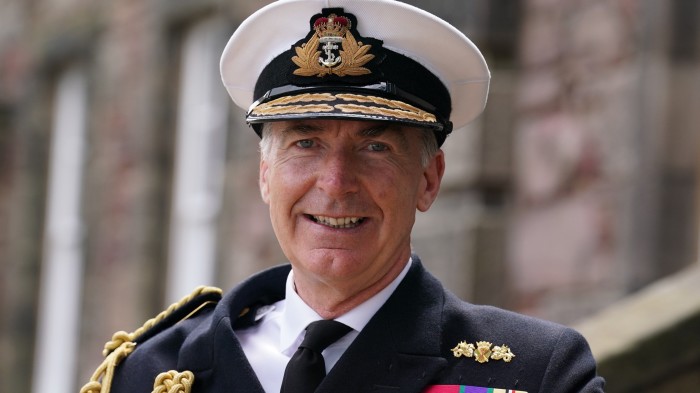Unlock the Editor’s Digest for free
Roula Khalaf, Editor of the FT, selects her favourite stories in this weekly newsletter.
The head of the British military has visited Beijing for the first time in a decade, in a visit announced only by the Chinese government.
General Liu Zhenli, chief of staff of the joint staff department of China’s central military commission, met for talks with Admiral Sir Tony Radakin, UK chief of the defence staff, in Beijing on Wednesday, according to a statement issued by China’s defence ministry.
“The two sides conducted in-depth exchanges on China-UK relations and military-to-military relations, international and regional situations and issues of common concern, and had communication on strengthening exchanges and co-operation between the two militaries,” the Chinese statement said.
The UK Ministry of Defence (MoD) made no announcement about the visit and declined to comment on Thursday beyond confirming it took place.
The last time the head of the British military visited China was in 2015, when General Sir Nicholas Houghton made a trip during the so-called “golden era” of Anglo-Chinese relations under then UK prime minister David Cameron.
While bilateral relations became increasingly frosty under later Conservative-led administrations, Prime Minister Sir Keir Starmer has stepped up engagement with Beijing since he won power last July.
UK chancellor Rachel Reeves and foreign secretary David Lammy have visited China in recent months, with Starmer expected to visit later this year.
However, some MoD figures privately questioned the wisdom of Radakin’s visit during a week in which the US-China trade war intensified and while Britain is urgently seeking to negotiate a reduction to the 10 per cent tariffs imposed by US President Donald Trump on UK exports.
UK officials said the trip had been planned for months and was not connected with the US in any way.
Matthew Savill, military sciences director at the Royal United Services Institute, a defence and security think-tank, said the extensive planning and long lead-up to such a trip would have posed a dilemma for the UK government in the circumstances.
“They will have had a difficult decision: ‘Do we cancel this or not?’ They don’t seem to have handled this well on the communications front,” he said.
It was a “bad” outcome that only the Chinese defence ministry had announced the high-level visit, Savill added, noting that UK officials may have viewed it as a “compromise” option to proceed with the trip but not to publicise it at the British end.
The visit has come ahead of the Royal Navy’s Prince of Wales aircraft carrier setting sail in a carrier strike group in several weeks’ time on an eight-month voyage to the Mediterranean and Indo-Pacific.
Twelve other nations, including Norway, Canada and Spain, are supporting the UK-led multinational deployment, which the MoD said highlighted “the strength of the UK’s leadership in seeking to uphold stability in the Indo-Pacific”.
The MoD has said the aircraft carrier will perform exercises with the Japanese military, in addition to joining a 19-nation exercise near Australia.
However, the UK government has not confirmed whether the carrier strike group will sail through the South China Sea in a freedom of navigation exercise, amid concerns about Beijing’s activities in the area.
Savill said Radakin’s trip to Beijing had probably been drawn up at least in part “to make sure no misunderstandings” took hold with the Chinese military about the British-led carrier strike group voyage.
UK officials said it was in Britain’s interest to maintain robust military-to-military communications with China. They added that the government has had firm conversations about the importance of peace and stability in the Indo-Pacific, as well as avoiding the use of military pressure to achieve political aims.




